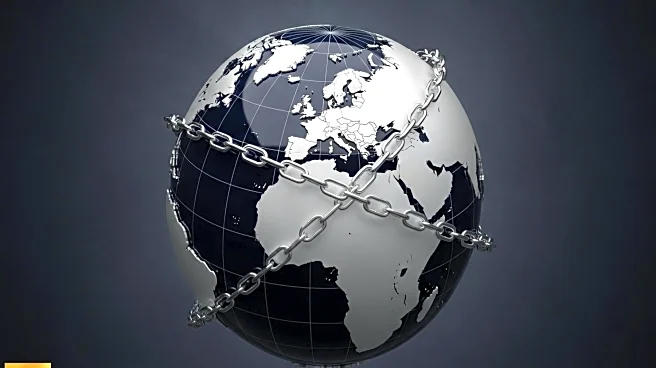What's Happening?
Britain, France, and Germany have announced their intention to notify the United Nations Security Council of Iran's significant violations of the 2015 nuclear deal. This notification will trigger the 'snapback' provisions of the agreement, reinstating international sanctions that were previously suspended. These sanctions include a conventional arms embargo, restrictions on ballistic missile production, asset freezes, and visa bans. The decision follows years of threats and unsuccessful negotiations between the European countries and Tehran. The original 2015 agreement included the United States, European Union, Russia, and China, but President Trump withdrew from the deal during his first term. Recent tensions have escalated following Israeli attacks on Iranian nuclear sites and a subsequent U.S. bombing campaign targeting Iran's nuclear facilities.
Why It's Important?
The reinstatement of sanctions on Iran is a significant development in international relations, particularly concerning nuclear non-proliferation efforts. The move by European nations underscores the ongoing challenges in negotiating with Iran over its nuclear program. The sanctions aim to prevent Iran from developing nuclear weapons, a concern shared by many global powers. The decision could impact diplomatic relations and economic conditions in Iran, potentially leading to further isolation and economic hardship. Additionally, the situation may influence U.S. foreign policy, especially given President Trump's previous actions and statements regarding Iran.
What's Next?
The snapback sanctions will automatically take effect after 30 days, unless countered by a Security Council resolution, which Russia has indicated it might propose. However, veto-wielding members like the U.S., Britain, and France are likely to block such a resolution. Iran has threatened to withdraw from the nuclear Non-Proliferation Treaty, which could further complicate international efforts to monitor and restrict its nuclear activities. The return of International Atomic Energy Agency inspectors to Iran marks a cautious resumption of dialogue, but the future of negotiations remains uncertain.
Beyond the Headlines
The decision to reinstate sanctions highlights the complex geopolitical dynamics surrounding Iran's nuclear ambitions. It raises ethical questions about the balance between diplomatic negotiations and military interventions. The situation also reflects broader tensions between Western powers and Iran, with potential implications for regional stability in the Middle East. Long-term shifts in international alliances and the role of nuclear diplomacy may be influenced by these developments.










